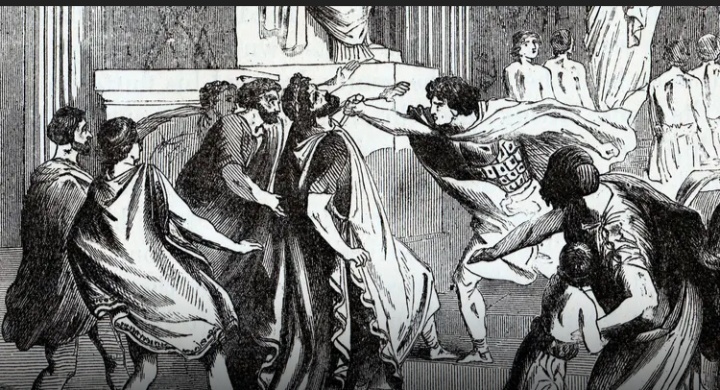Did Alexander the Great Arrange His Father’s Murder?
Philip II of Macedon’s bodyguard—and former lover—wielded the knife. But 21-year-old Alexander, heir to the powerful king, quickly fell under suspicion.”
spicion.
In the ancient world, the young and dashing Alexander the Great led his army from northern Greece to what is now Pakistan, leading from the front, killing enemies with sword and spear. He ordered executions and massacres, even stabbing one old friend to death in a drunken rage. He killed a lot of people—but did he launch his career as a king by arranging the murder of his own father, the hugely successful Philip II?
Philip’s career made Alexander’s conquests possible, for it was Philip who saved Macedonia from the verge of extinction, beating off powerful neighbors before expanding until he dominated Greece and the Balkans. In the process, he created a uniquely effective army, combining many different types of troops into one formidable, fast-moving team. This was the army Alexander led against the Persian Empire, composed of Philip’s men, fighting in the same way they had done for more than 20 years.
The facts of Philip’s murder, in 336 BC, are plain and undisputed. The assassin struck in the theater at Aegae (modern Vergina), watched by a crowd who had travelled from all over Macedonia and Greece to show support for the king. As Philip made his entrance—limping from an old wound, but still active in his 47th year—one of his bodyguards, a young man named Pausanias, ran toward him. Producing a concealed dagger from beneath his cloak, he stabbed Philip between the ribs and fled. The king died within moments, followed quickly by his assassin—as Pausanias sprinted towards the waiting horses, he tripped on a vine root and was swiftly dispatched by his fellow bodyguards.
Pausanias’ personal motive for the murder was also widely known. As a teenager, he had for a while been the king’s favorite and lover. Polygamous like all Macedonian kings, Philip was notorious for his numerous affairs with women and young men. Yet soon Philip’s eye wandered, and he replaced Pausanias with another youth. Resentful, Pausanias mocked the new lover, accusing him of being effeminate and an easy conquest. The new lover, stung by the jokes, tried to prove his manhood in battle by fighting recklessly and was killed.
The dead youth had friends and relatives in high places, notably Attalus, whose niece was taken as a bride by Philip in 335 BC. Secure at court, Attalus decided to take revenge on Pausanias, inviting him to a feast and getting the young man drunk. The nobleman and his friends savagely beat Pausanias and may have raped him. Then they gave the battered youth to Attalus’ muleteers, who proceeded to violate him, one after another.
Source -History. com


